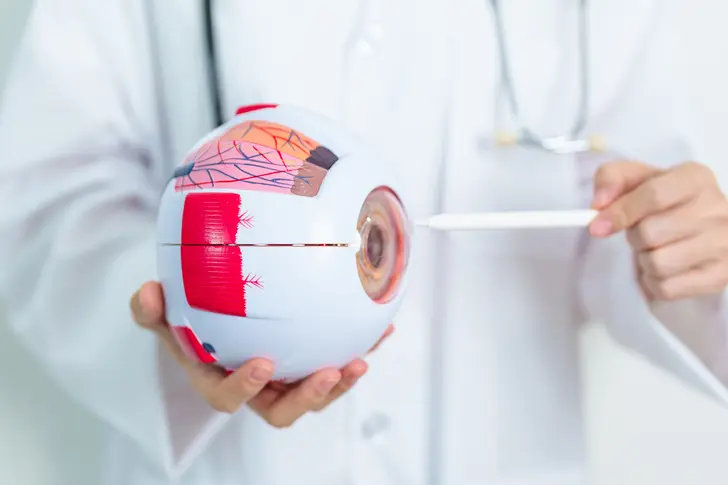- Age-Related Macular Degeneration (AMD)
- Wet Age-Related Macular Degeneration
- Geographic Atrophy
- Appointment Prep
- View Full Guide
AMD Devices and Tech


Understanding AMD
Age-related macular degeneration (AMD) is a leading cause of vision loss in older adults. While it usually doesn’t cause complete blindness, it can significantly impact your daily life. Assistive devices and technologies can help you stay independent and enjoy a better quality of life.

Magnifying Eyeglasses
Eyeglasses with magnifying lenses or telescopic lenses can improve your vision. These glasses enlarge the visual field. Be aware that they may affect your posture and cause neck pain because the more powerful the lens the closer you need to be to the text. Prismatic glasses can also help by redirecting light to parts of the retina less affected by AMD.

Handheld and Tabletop Magnifiers
Handheld magnifiers come in various sizes and strengths, often with built-in lights to improve visibility. Some models have features like color contrast and image capture, making them useful for reading and other detailed tasks. Tabletop magnifiers are mounted on stands and can help those with hand tremors or poor eye-hand coordination.

CCTV Magnifiers
Closed-circuit television (CCTV) magnifiers use a camera system to project magnified images onto a screen. This technology allows for larger and clearer viewing of text and images. CCTV magnifiers can help you read faster.

Large-Print and Audio Materials
Large-print books, magazines, and other reading materials use bigger and bolder text. They can reduce eye strain and make reading more enjoyable. You can find free audiobooks and other audio materials from public libraries and nonprofit organizations for people with low vision.

Walking Canes
Walking canes, including high-tech versions with ultrasound sensors, can help you get around safely. These canes can detect objects and provide feedback through vibrations, helping you avoid obstacles.

Smart Appliances
Clocks, phones, and remotes with large numbers and voice-activated features can be very helpful. Screen readers on smartphones can read your text messages and other content aloud, making it easier to stay connected.

Choosing the Right Devices
With so many assistive devices available, it can be overwhelming to choose the right one. If you need help, ask your eye doctor or a vision rehabilitation specialist for guidance.
Photo Credits:
1. iStock/Getty Images
2. iStock/Getty Images
3. Lena Evans/Shutterstock
4. Panchenko Vladimir/Shutterstock
5. Castleski/Shutterstock
6. one photo/Shutterstick
7. Stock-Asso/Shutterstock
8. Stock-Asso/Shutterstock
National Eye Institute: “Age-Related Macular Degeneration.”
Indian Journal of Ophthalmology: “Low-vision interventions in individuals with age-related macular degeneration.”
StatPearls: “Low Vision Aids.”
Cochrane Database of Systematic Reviews: “Reading aids for adults with low vision.”
Cureus: “Current Modalities for Low Vision Rehabilitation.”
Ulverscroft Foundation: “Our History.”
Visible Language: “Reading Digital with Low Vision.”
Clinical Optometry: “Smartphones-Based Assistive Technology: Accessibility Features and Apps for People with Visual Impairment, and its Usage, Challenges, and Usability Testing.”
American Foundation for the Blind: “Medicare, Medicaid, Social Security Policy.”
National Council on Aging: “Medicare and Vision Coverage.”
LionsVision Resource Network: “Grants for the Blind and Visually Impaired.”
U.S. Department of Labor Office of Disability Employment Policy: “Accommodations.”
National Eye Institute: “Vision Rehabilitation.”
American Academy of Ophthalmology: “Low Vision Assistive Devices.”BrightFocus Foundation: "Age-Related Macular Degeneration: Facts and Figures," "Living with Macular Degeneration," "Specialty Glasses for Macular Degeneration."
UC Irvine Health: "Sunglasses — Protect your eyes outdoors," "Low Vision Assistance."
Optometrists Network: "What are Prism Lenses?"
Macular Society: "Low vision aids."
VisionAware: “What Type of Cane Should I Use?”
American Academy of Ophthalmology: "Low Vision Assistive Devices."
American Macular Degeneration Foundation: "Assistive Technology for Age-related Macular Degeneration."
HIE Help Center: "Purchasing Adaptive Equipment: 20 Questions to Ask Before You Buy."
The Carroll Center for the Blind: "Magnifiers."
Association of Blind Citizens: "Assistive Technology Fund."
iCanConnect: "Apply to iCanConnect."
NeedyMeds: "Diagnosis-Based Assistance Programs for Blindness."
Living Well With Low Vision: "Suppliers of Low Vision Devices," "Suppliers of Reading Materials in Audio."
The Low Vision Shop: “WeWALK Smart Cane.”
Translational Vision Science and Technology: “Bioptic Telescope Use in Naturalistic Driving by People with Visual Impairment.”
Social Security Administration: “If You’re Blind or Have Low Vision --How We Can Help.”
California Council of the Blind: “A Review of Smart Glasses.”
Myvision.org: “Implantable Miniature Telescope Lens for Macular Degeneration.”